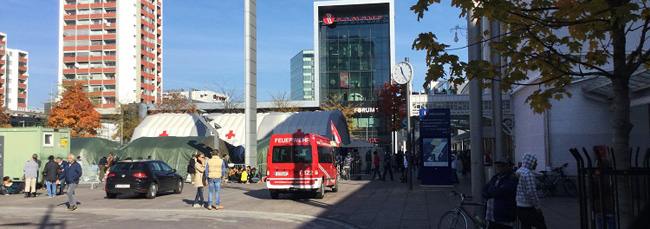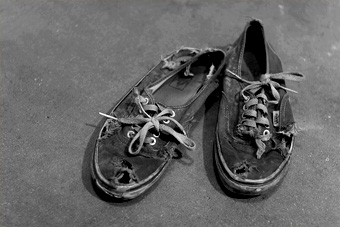CURRENT AFFAIRS
Sojourns of the Children of Abraham
A Story of Middle East Refugees

By faith Abraham, when he was called, obeyed by going out to a place which he was to receive for an inheritance; and he went out, not knowing where he was going. By faith he lived as an alien in the land of promise...for he was looking for the city which has foundations, whose architect and builder is God...all these died in faith, without receiving the promises, but having seen them and having welcomed them from a distance, and having confessed they were strangers and exile on the earth...But as it is, they desire a better country, that is a heavenly one. Therefore God is not ashamed to be called their God; for He has prepared a city for them. Hebrews 11:8-10, 13, 16The physician entered the clinic, prepared to treat refugees of a foreign war. With him was the translator, himself a refugee who knew Arabic and English. The translator's family was broken, with his father and new wife in the destination country, and his mother back in a war-torn city. A family as broken as the refugees who entered the clinic.
Therefore, since we have so great a cloud of witnesses surrounding us, let us also lay aside every encumbrance and the sin which so easily entangles us, and let us run with endurance the race that is set before us...for consider Him who has endured such hostility...so that you will not grow weary and lose heart. Hebrews 12:1, 3
The physician and the translator welcomed the next patient. The young man had traveled a much greater distance than the translator, likely over a thousand miles. He had no socks, and much of the time had traveled without any shoes at all. His feet had obvious sores, and his clothes had not been washed for many days — or perhaps weeks. His thin-soled canvas shoes carried the thick smell of poverty. The physician and young man faced each other, sitting on ill-fitting cots. The physician carefully lifted his feet, one foot at a time, to inspect, and see how he could best care for each foot. The young man had probably worn out many shoes on his travels, as the left ankle had an abrasion most likely created by ill-fitting boots without socks. The top of the right large toe had a small abscess; again, likely from not wearing socks. After the physician cleaned the young man's foot, he carefully lanced the small abscess with a needle, emitting a large amount of purulent pus. Careful examination revealed no deeper nor more serious infection. The physician asked about how the wounds had happened; the translator passed on to the physician that the young man did not know for sure, as he had often been barefoot and could not feel his feet.
The translator then observed something that he had never experienced before. The aid station had shoes, but had run out of the size that the young man needed. The physician knew that though his own shoes were well used, they also were built for trekking, with warm, strong, and breathable fabric and a good sole — shoes he himself had used for trekking. So he removed his shoes, and asked to give them to the young man. The translator tried to intervene, saying he, a fellow refugee with more means than the young man, should be the one to donate his shoes. The physician demurred. The translator enlisted the support of a local nurse, who agreed that the physician need not donate his shoes. The physician stood firm, reminding them that although the clinic had socks, they had no shoes to fit the young man. "What will you wear back to your place?" asked the translator. The physician replied, "His shoes."
The physician carefully dressed the young man's wounds. He passed on bandages that he had purchased earlier that day, and a small foot-care kit to the grateful young man. The physician then placed his shoes on the refugee to ensure they would fit. The translator had never observed such an act before.
Later that night, after the patients had all been seen, the translator and physician talked. The translator was surprised to find that the physician had once visited close to his home, knew many of the words he spoke, and had also traveled much of the land around the makeshift aid-clinic at the train station they were at that day. The physician asked of his family, and the translator shared briefly his story, a story of broken relationships and a broken home; broken in many ways, and scattered across many lands.
The physician spoke of hope, especially the hope of Abraham. He pointed out that the translator had come from the nearby home of Abraham, and mentioned he had also visited the place that Abraham had sojourned. The translator spoke of knowing that Abraham was the father of many prophets. The physician then shared of the One who makes Himself known to those who seek. The translator asked if the physician had read the book of his prophet, and the physician affirmed he had. The physician then explained that the Prophet born of the promise of Abraham would make Himself known to him. The physician used His Name, the Name of the Prophet, in the natural tongue of the translator. The physician then offered an account of the Prophet's life, written by the Prophet's best (earthly) friend. The translator appeared to gratefully accept the account of the hope of Abraham.

The physician understood, dimly, many aspects of the gospel in a new way. How Jesus' humbling of Himself when He washed the feet of the disciples took on new meaning; "...but [He] emptied Himself, taking the form of a bond-servant, and being made in the likeness of men" (Philippians 2:7). The translator had been willing to listen to the hope of Abraham after he had observed a "person of stature" humble himself to help clothe and wash another, then (literally) walk in his shoes. The physician also better understood the humbling of the woman who had washed Jesus' feet with her hair in front of others. Her hair was her dignity, and washing Jesus' feet was her sacrifice to Him. The willingness of the physician to intimately care for one of low esteem had opened a door to speak to the translator of the hope available for people of every esteem.
The physician wondered at the path that had brought him here. He had planned to take a portion of his "holiday" to serve others. He had shared this plan with a friend at home, a Palestinian Christian previously "displaced" from the Holy Land, and his friend had given him several copies of the first-hand account the Prophet's best friend had written about the Prophet. The book was in the natural tongue of those who said they knew of Abraham, but could not know the Prophet of Abraham's hope. The physician had carried these short accounts in his pocket, praying for an appropriate opportunity to provide the account of hope to those sojourning for a better life. The door had opened for the physician to provide the account of hope to two individuals not via a role of authority, but through an act of humility. Just as it is that by Jesus/Isa's humility we come to know of the grace and love He has for us.
And the Word became flesh, and dwelt among us, and we saw His glory, glory as of the only begotten from the Father, full of grace and truth.John 1:14
Image Credit: Mikey Wally; "Old Vans"; Creative Commons
Tags: Christian-Life | Controversial-Issues | Current-Issues | Health-Wellness | Ministry-Church | Personal-Life | Personal-Relationships | Political-Issues | Witnessing-Evangelism
comments powered by Disqus
Published 10-28-15

